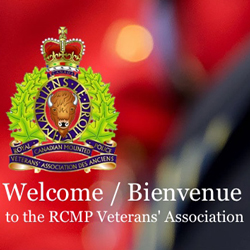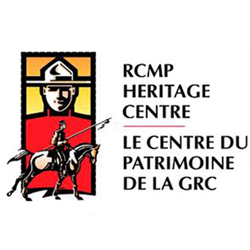Surrey Detachment: First General Investigation Section Member

Back in 2012, I had the opportunity to interview Bob MacKeracher about his time in the Force and his time stationed at the Cloverdale Detachment.
On May 1, 1951, the RCMP took over the municipal policing of the municipality of Surrey from the Surrey Municipal Police Department.

The initial compliment of RCMP members consisted of 18 RCMP members. In the forthcoming months, other members were added to the establishment strength. Check out our article entitled “RCMP Takes Over Surrey” webpage here. One such member was Constable Robert (Bob) MacKeracher (Reg.#15423).

1954 – Photograph of RCMP Cloverdale Detachment members standing infant of their office building.
When asked why he joined the Force Bob responded by saying – “In my late teens and living in Eston Saskatchewan, I decided to jump a train and catch a ride to Vancouver. When I got off the train in Port Moody – I was able to obtain ‘room-and-board’ with Clifford Alford and his family. Thereafter, I worked at various locations in the Vancouver area. It was Clifford’s brother, Arnold Alford, who convinced me to join the RCMP. Arnold was at the time a member of the Force.I applied for the RCMP in Vancouver and was deemed to be an acceptable candidate.Instead of being sworn in at Vancouver, I received approval to be sworn in at Depot Division. My reason for doing so was that I wanted to reconcile things with my mother who was still living in Eston Saskatchewan.”
In 1948, Bob joined the Force and took his basic training at “Depot” Division in Regina. After training, he served a year at Winnipeg Beach Detachment and then two years at Lytton Detachment. In late 1951, he was transferred to Cloverdale Detachment. At the time, there were no specialized sections at the Detachment.
Bob recalls his time at Cloverdale Detachment as follows – “I wasn’t in Cloverdale on May 1, 1951 when the other RCMP members walked into the Cloverdale Detachment for the first time. Instead, I arrived the following day because I had to catch the bus from Lytton as I didn’t have a car in those days.
With the exception of Paul Starek, Jim Craig, and Bill Turner, all the original 18 members of Cloverdale Detachment were single. The Force policy in those days was that you had to have 5 years service in the RCMP and had to possess a grand sum of $1,200.
To accommodate the sudden injection of 15 original single members, the Force arranged for accommodations for us at the Clover Inn and above the Post Office.
I can remember the first few days in Cloverdale. After getting up and dressed in our brown serge, breeches, high brown boots and stetson, we would walk in a group down the main street in Cloverdale to either go for breakfast or head to the Detachment. In those early days, we would get plenty of looks from the people in Cloverdale as we walked past the stores. I guess they thought that some major event was about to occur with so many uniformed RCMP members in Cloverdale.
Early members in Cloverdale found it difficult on navigating their way around Surrey because there were no maps of the municipality in those days. We would often ask Paul Starek or Jim Craig on directions on how to get to a specific address or location in Surryey.
In the winter and spring, the fog was so thick that it made it difficult drive. The fog was probably attributed to the ‘bee-hive’ burners along the Fraser River and many people were using sawdust burners to heat their homes. Many times, I had to roll down my driver’s window and look for the white light as I drove slowly down the road. In so doing, you had to be extremely careful of not driving into any of the deep ditches which were quite common in those days. There were a few days that we were not permitted to take a police car out of the Detachment because the fog was so thick and visibility was so limited. The worst area for fog was the intersection of the Trans-Canada Highway (now Fraser Highway) and Pacific Highway (176 Street).”
I asked Bob what he recalls the challenges were in policing Surrey while he was based out of the Cloverdale Detachment. His response was – “One of the early problems we had to address was speeding cars on King George Highway. It was on this stretch of road that Jack McNamara got hit at the intersection of King George Highway and the Trans-Canada Highway (now Fraser Highway) by a speeding car.
As the Detachment grew in size, the Detachment Commander decided that we needed two specialized Sections: Traffic Section and Plain Clothes Section. Jack McNamara and I were selected to form the first Plain Clothes Section at Cloverdale Detachment.

Photograph of Constable Bob MacKeracher as one of two original Cloverdale Detachment plain clothes members (Source of photo – Surrey Archives).
The dress standard for an RCMP Plain Clothes unit was to wear a suit. We later discovered that many criminal types could easily pick-out that we were RCMP members because we wore the standard RCMP socks all the time.
In the 1950s, the business break-ins and safe attacks were a major problem especially in the Whalley area. The individuals committing these offences were really bad characters. To better protect the Surrey businesses, Jack McNamara and I went around to most business in Surrey to review their physical security and make recommendations which would include: changing their locks, installing better lighting and an alarm system.
Our Plain Clothes Section used an old unmarked Plymouth police car. The vehicle was so under powered that it was difficult for us to make up any steep hill.”
From Cloverdale Detachment, Bob was transferred to many other Detachment and duties across the country:
1960 to 1961 – Field Detachment
1961 to 1962 – 100 Mile House Detachment
1963 to 1970 – Depot Division as a Law Instructor
1971 to 1974 – Depot Division as Assistant Training Officer
1975 to 1977 – Canadian Police College – Ottawa for two years
1978 to 1980 – Training & Develop Branch – Ottawa
1981 to 1984 – Depot Division as the Officer in Charge Training & Development
1984 – Retired from the Force
Bob was asked about his proudest moment in the Force and his response was – “My proudest moment was being sworn in as a member of the Royal Canadian Mounted Police. In growing up in Saskatchewan, we all knew about the RCMP and what the organization stood for. So, when it was suggested that I join the RCMP, I jumped at the suggestion. My mother was very proud of me in joining the RCMP.
By being in the Force, I have had the opportunity to travel throughout this country and represented the RCMP in Uganda. I would not have had these opportunities if I had stayed on the farm in Eston Saskatchewan.
I have dedicated my service in the RCMP to carry on the traditions that other members have contributed throughout the years.
I enjoyed my time in the Force with only one exception. I struggled and had difficulties with the Physical Training (PT) classes during my basic training at Depot Division.
One particular assignment I found extremely rewarding was being seconded to Uganda in 1980. This assignment was to assist the new Ugandan government in establishing a credible police force after Idi Amin left the country. My specific function was to assess the training requirements for their new police department and coordinate this initial training.
At the time in Uganda, clean water was a critical commodity. It was a challenge trying to piece together training classes as the friction and hostilities between the different tribes was so apparent after Idi Amin departed the country.”
On May 5, 2017, Bob passed away in Regina close to his family and “Depot” Division where he served as the “Depot” Division’s Training Officer. You can read his obituary here.



 August 10, 2017
August 10, 2017 






